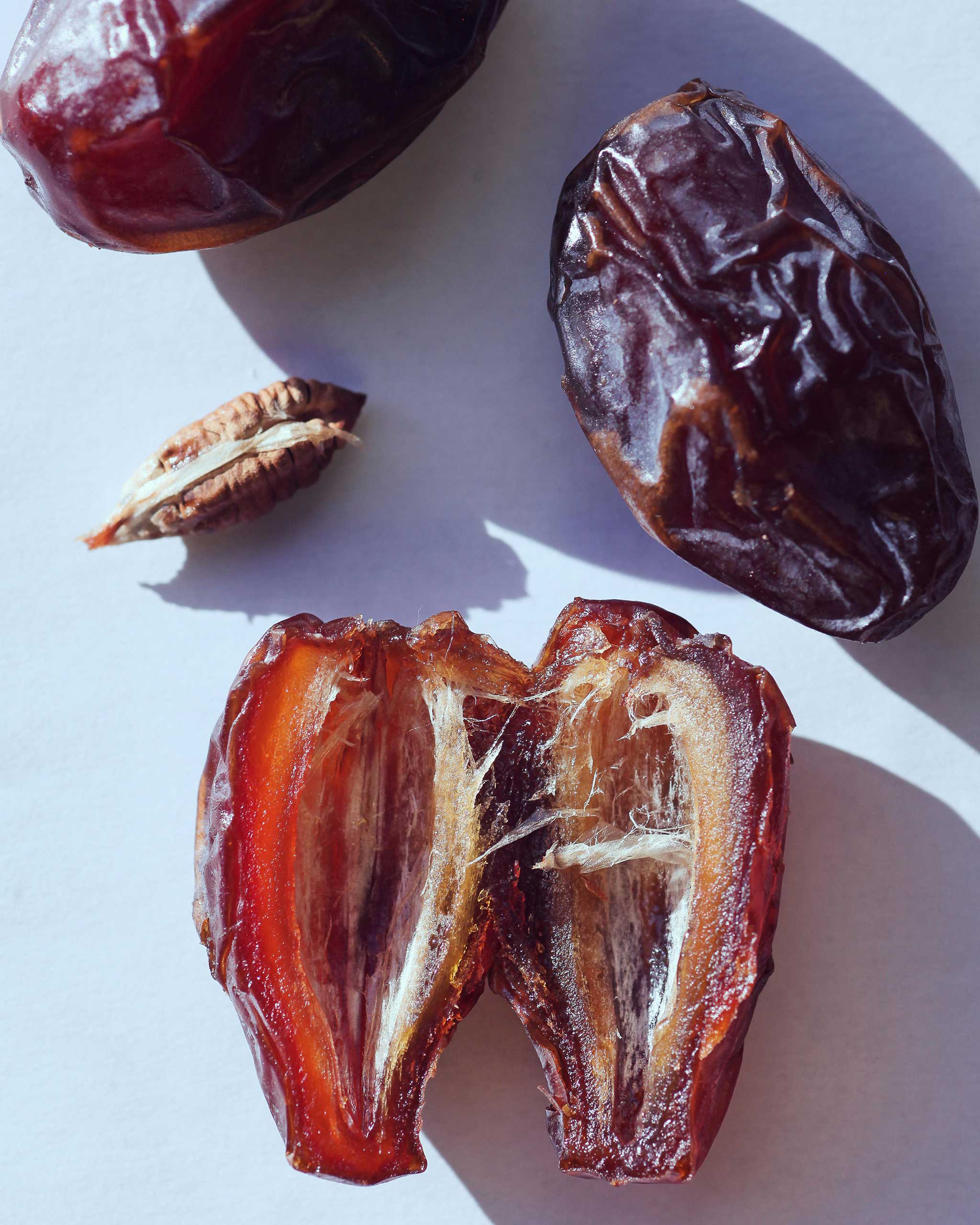Photo: Kokokara/Pexels
If you’ve ever been to Palm Springs, you may have noticed that dates are everywhere. The shriveled little fruits are the star ingredient in the city’s famed date shakes and sticky date cakes; in fact, there are so many date farms in the area that touring one is regularly listed as one of the area’s many “things to do.” But dates aren’t just a Palm Springs thing—they’ve long been a staple in traditional Middle Eastern and North African cuisine. They’re an extremely important part of the Islamic holy month of Ramadan, when they are traditionally eaten each day at sunset to break the day’s fast.
Recently, you may have also noticed dates popping up in health food stores and touted as a “healthy” sugar alternative. But here’s the thing: dates definitely don’t taste like something that would be good for you. They actually taste pretty decadent—almost like candy; they’re chewy and sweet, with rich caramel and honey notes. Their natural deliciousness is actually what experts say makes them so appealing.
“Dates are particularly great as a complete sugar substitute because, unlike sugar, they have so many positive accompanying substances,” explains food author and nutrition expert Dagmar von Cramm, when we ask “are dates healthy?” They add the fruit is high in minerals like potassium, copper, and iron. She also says that because they are very low in acid, a little goes a long way: “Even small amounts of dates seem very sweet.”
What exactly are dates, anyway?
Dates are the fruits of the date palm and have been considered a healthy and important ingredient in the Middle East, where they originated, since at least 4000 B.C. Their shape can be described as an elongated and oval—a little like an oversized, plump raisin. The color can vary depending on the variety, but is always light to dark brown. The dried fruits have thin skins and are sticky and creamy inside, with a consistency similar to dried figs or prunes. The main flavor notes are caramel, honey, and brown sugar.
There are a lot of different types of dates—around 400 to be precise. But the best-known varieties are the Medjool (or King) date and the Deglet Nour (or Finger of Light) date. The varieties differ not only in appearance but also in flavor, with some variants tasting significantly sweeter than others. Some are also more nutritious than others.
Are dates healthy?
With a high carbohydrate and calorie count—as well as high levels of glucose—it’d be easy to discount dates as mere empty calories. However, dates actually have a lot of positive properties, including a surprisingly low Glycemic Index. One important reason? Fiber. With nearly 7 grams of fiber per 3.5 ounce serving—that’s about 4 Medjool dates—they’re an excellent source of this all-important dietary component and are known to slow digestion, keep blood sugar levels from spiking, and keep gut health in check. (This is why, incidentally, dates work so well as fast-breakers during Ramadan.) And, studies have also found that people who eat dates daily see significant improvements in their bowel function compared to when they don’t eat dates.
But the benefits of dates don’t stop there. Dates are also rich in a ton of essential nutrients. They contain some of the highest quantities of cell-protecting and disease-fighting antioxidants of any fruit, elements like polyphenols, tannins, flavonoids, carotenoids and contain amino acids, like tryptophan, which the body uses to create melatonin. They also contain valuable vitamins and minerals like calcium, iron, magnesium, potassium, phosphorus, sodium, zinc, and manganese as well as vitamin A, vitamin B1 and vitamin B2. They also provide the body with copper, fluorine and selenium, all of which contribute to healthy nerve function and cell growth.
There’s also some evidence that dates may be really great for brain health as well. Laboratory studies have found that dates are helpful for lowering inflammatory markers in the brain, which could help lower the risk of neurodegenerative diseases like Alzheimer’s and could even improve memory and learning.
Just don’t overdo it. Most experts say no more than six dates per day is plenty. And keep in mind that most of the dates found in the United States are sold dried, and that means the nutritional content might be slightly less than that of the fresh versions. It also means each date contains less water and more sugar per ounce. “Like all dried fruits, dates contain a lot of minerals and fiber,” von Cramm says. “But because of their high sugar content, I don’t recommend eating them in the same quantities as fresh berries or citrus fruits.” She advises drinking plenty of water: “If you eat dates and forget to drink a lot of water, you risk constipation—but that happens with all dried fruits. So, drink enough fluids to help aid digestion.”
The best way to eat dates?
There are endless ways to enjoy dates—and not just in the form of syrup as a natural sugar substitute for baking or in coffee. If you want to eat them in their whole, dried form but find them a little hard, they can be softened easily by soaking for a few minutes in water. Try them on bread with peanut butter and a pinch of sea salt (cut them lengthwise and remove the pits) or mix chopped and pitted dates with greek yogurt, curry powder, and chives for a sweet-savory dip.
Or, do as they do in Palm Springs and blend them into a smoothie for an added dose of indulgent—and as we know now, nutritious!—sweetness.
This article was originally published on Vogue.com.
